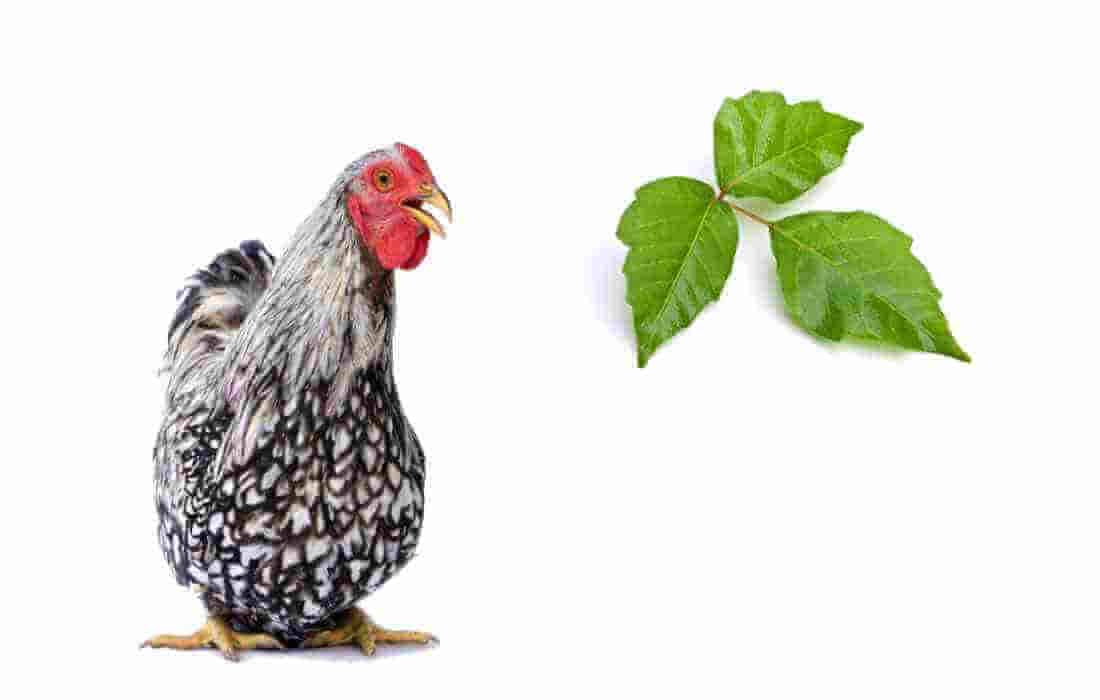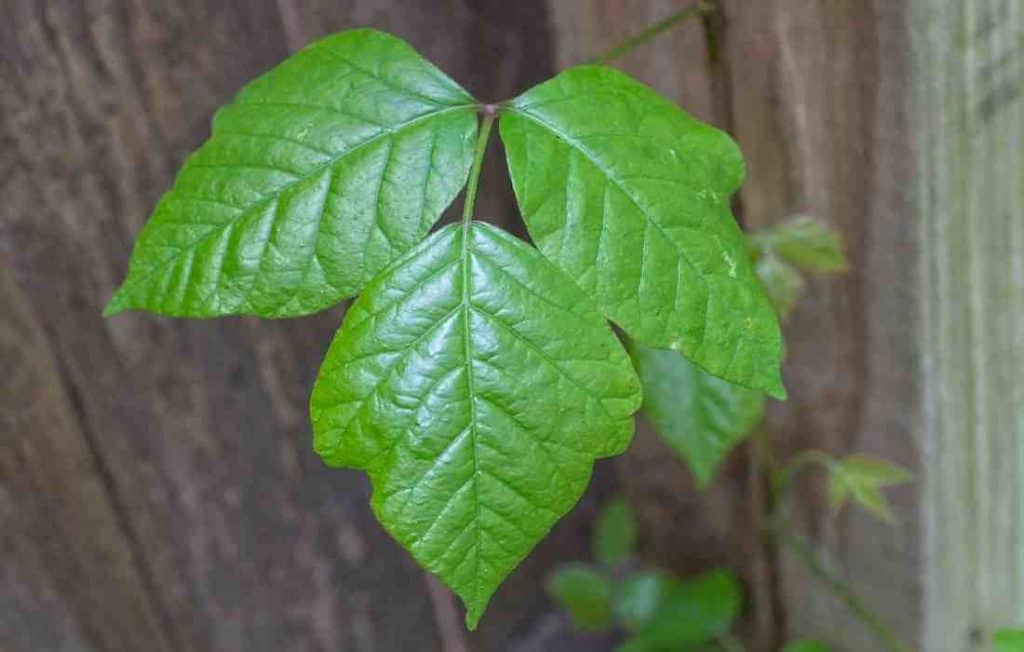Chickens need a wide variety of foods to have a balanced diet, but there are also many things a chicken cannot eat. Many plants grow in the wild that are toxic to your flock, and these plants could be in your yard. One of the most common growing poisonous plants is poison ivy. This plant is toxic to people, but is it also toxic to chickens? What should you do if your chicken consumes it?
Can Chickens Eat Poison Ivy Leaves
Yes, chickens can eat poison ivy leaves with no reaction. Poison ivy leaves are not poisonous to your chickens or most animals; just be careful not to touch your chicken if it’s been near the plant as the oils could rub off onto your skin.
Can I Get Poison Ivy From My Chickens?
Poison ivy is not harmful to chickens and won’t kill them. That said, chickens can spread the poison ivy through their poop and touch. For example, when chickens eat poison ivy, when you come into contact with them through touch, there’s a good chance you’ll come into contact with the oily resin called urushiol.

So if your chickens have come into contact with poison ivy, it’s important to avoid touching them for at least 24-72 hours. That said, if you do come into contact with them, it’s important to know the signs and symptoms that can occur after exposure.
Below are some of the allergic reactions that can occur:
- Itching (aka dermatitis)
- Swelling
- Redness
- Blisters
- Problems breathing
When these reactions occur, it’s important to seek medical attention as soon as possible as the reaction can worsen over time. While chickens are not allergic to the poisonous plant, most humans are, and it’s a good chance you will develop a rash after coming into contact with it.
What Is Poison Ivy
Poison ivy is a poison ivy vine that can grow along trees, walls, pavement, and anywhere along the outside floor.
There is an oily substance inside the sap in all parts of the plant called urushiol, found in the leaves, roots, and stems. It is responsible for the allergic reactions and rashes on human skin.
Identifying Poison Ivy
Poison ivy can be difficult to find as it changes color and appearance with the seasons but is generally green with one big leaf and two smaller ones off to the side; all three leaves have pointy tips.
It grows in vine form, having multiple sets of leaves along the vine. If you’re looking to avoid the plant altogether, it’s crucial to know how the plant looks in each season.
This is how the plant looks each season, according to Healthline:
* Spring- In spring, poison ivy leaves are red and/or green with green flower buds. The buds will slowly open and appear off-white.
* Summer- The leaves in summer are entirely green, and the newly growing leaves will be red.
* Fall- The leaves turn bright yellow, red, and orange.
* Winter- In winter, the leaves turn deep red and eventually shrivel off. This leaves the twisting vine/roots bare, but be careful as these can also cause a rash.
At any time, you may notice little white berries growing beneath the leaves.
Is Poison Ivy Bad For Chickens

Poison ivy (Toxicodendron radicans), also referred to as eastern poison ivy, is neither bad nor healthy for chickens and does not appear on the PoultryDVM Toxic Plant Finder list.
Poison ivy does not affect chickens or most animals, for that matter. This is because animals in general, have a very different histamine and allergen response than humans do.
According to Hobby Farms, goats, chickens, and other animals view poison ivy as a tasty weed. Chickens, other birds, and other animals love eating the little white berries that grow beneath the ivy leaves.
The seeds are how the plant itself spreads; animals ingest the seeds through the berries and spread them around through their droppings.
Your chickens might not be drawn to eating the leaf of the ivy itself, but if it does consume some, it will not cause them any harm.
You should be more concerned about not making direct contact with the chickens in your flock if they have been near poison ivy as they could spread the poisonous oil from their feathers onto your skin.
I’d also be concerned with more poisonous plants that may be growing in your yard that are dangerous for chickens such as azaleas, bulbs, ferns, etc.
Will Chickens Eat Poison Ivy?
Chickens are natural foragers that will eat just about anything. That said, they won’t go out of their way to eat poisonous plants. If your chickens have eaten any type of poisonous plants, it’s usually unintentional, or they are underfed.
What To Do If A Chicken Eats Poison Ivy
It is entirely up to you whether or not you will allow your chickens to eat poison ivy if it’s in your yard, but if you know they have eaten some, it’s important that you don’t touch any of your chickens.
You should be more concerned about your chickens passing it on to you rather than about them eating it as it will not cause any harm.
The oily urushiol from the sap can quickly transfer from your chicken to your skin and cause a reaction. If you touch your chicken knowing it’s been touching the poison ivy leaves, immediately wash the area of contact with dish soap.
You can also wash your chickens with oil/grease, cutting shampoo or Dawn dish soap after they’ve been foraging.
Wash your skin immediately if you’ve come into contact with it while handling your chicken. Use warm water and soap to reduce the chances of getting a poison ivy rash. If you don’t have access to soap and water, use rubbing alcohol (hand sanitizer) until you can wash with soap.
You should also be careful to wash any eggs your chicken has come in contact with so you don’t accidentally ingest any of the oil.
If you choose not to allow your chickens to eat the ivy leaves, you should remove it from your yard, so it doesn’t spread.
Natural Weed Kill for Poison Ivy
While not as fast-acting as a weed killer, it is not toxic, and you won’t be putting your chickens at risk.
To make this natural weed killer, you need the following:
1 tablespoon Dawn dishwashing detergent
One gallon horticultural or organic vinegar (20%)
1/2 cup of salt
Mix the ingredients without diluting the water. Pour the mixture into a spray bottle, spray the leaves, roots, or pour it directly over the plant.
You’ll want to keep repeating the process of spraying the plants until they are completely gone and don’t come back.
Avoid using any harsh chemicals like Round-Up or other weed killers, as they can be toxic to your chickens.
If the plants keep coming back and you’re worried the plants will harm your chickens, then you may want to consider getting some goats. After all, goats can eat poison ivy, and they get along fine with chickens.
Final Word
Chickens can, and will, eat poison ivy leaves without any ill-effect on their part.
You should, however, be concerned about your chicken passing on the poisonous oil to your skin.
Removing the ivy from your yard is the only way to ensure you won’t pick it up from your chickens.